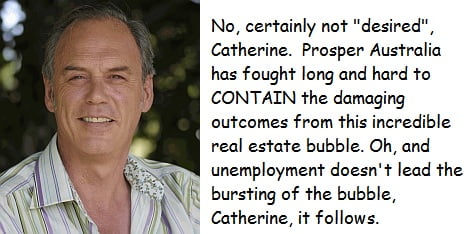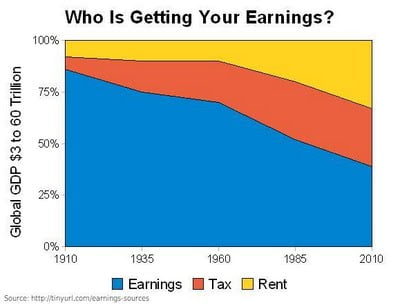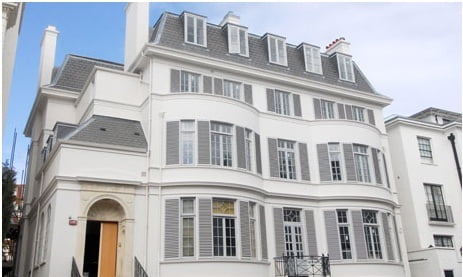And the below is worth looking at, too– at least the first part where Nick Hubble shows that taxes are theft. But, oh dear, then he goes right off track to confuse the rent of our land and natural resources with taxes! Really, Nick? Really!
THE DAILY RECKONING
From Nick Hubble in St Kilda:
Australia’s tax legislation is, according to urban legend, the longest piece of legislation in the world. One of our law professors reportedly has an entire room devoted to books of Australia’s extensive tax law. Part of the story is that Australia has several tax Acts.
Best of all, ‘if Australia keeps making new laws at the current rate, there will be 830 billion pages of tax legislation by the turn of the next century,’ said Robin Speed from the Rule of Law Association in the Sydney Morning Herald. In 2006, 4100 pages were taken out of the tax legislation to ‘improve readability’. What a relief!
Then there is the 10,000 rulings a year the Australian Taxation Office issues (based on the average between 2000-08). Each of them can have the same weight as an Australian High Court decision.
What does this mean for you? ‘Australians pay at least 125 different taxes each year,’ your Treasury says on its website. ‘…there could be as many as 160 different state taxes and 259 taxes nationally.’ Then, on top of that, there are local government rates.
Our favourite taxes are the Wine Equalisation Tax (WET), which is 29% of wholesale sales. And the superannuation funds tax – yes, you pay taxes on money the government forces you to save in Australia.
But all this is simply not enough. And so the Mineral Resources Rent Tax is following in the footsteps of the existing Petroleum Resource Rent Tax. And the Carbon Tax is following in the footsteps of the failed European emissions trading scheme debacle.
Perhaps that law school professor will need a second room to house this ever-growing pile of legislation.
Why do you, as an investor, need to worry about this kind of politicking? Well, tax is theft. With the threat of violence thrown in for good measure. There is simply no way of getting around that basic truth, as uncomfortable as it might make you feel.
First, to the claim that taxes are a violent threat. If you don’t pay taxes – and don’t cooperate with the consequences of refusing to pay them – the police will happily lock you away. And if you refuse to be locked away, the police will use force to make sure you are.
But why is tax theft? Well, if you get together a group of friends and they democratically vote to take away your money, that’s theft. But if a slightly larger group known as the Australian electorate and their representatives try it, it apparently isn’t theft any longer.
Of course, tax is not actually theft. For that to be the case, you would have to own your own income. But you clearly don’t in Australia today. That’s evident in the fact that the Australian government, if it so voted, could tax you at 100% of your income. And you don’t own what somebody lets you keep at their whim.
For now, the politicians are letting you keep some fraction of your income. Lucky you. What a privilege.
But don’t worry, you can always increase how much of your income you can keep by declaring deductions. Throw the dog a bone…
Over in Britain, the government decided to make things a little more transparent than the Aussie government has here. British taxpayers will now get a wonderfully colourful description of how much of their taxes went where:
… according to Treasury calculations based on current taxes, someone earning £50,000 would be informed that their taxes will fund £4,727 worth of welfare payments, including £493 of housing benefit annually and £860 in sickness benefits.
.. a £50,000 earner will also contribute £2,469 to government health spending, £818 to defence and £141 to overseas aid. Almost £1,850 of their income is spent on education and £705 on “public order and safety”, including £381 on the police, £98 on prisons and £70 on the fire service. The sum of £903 goes on repaying debt interest and £70.56 to the European Union.
In total, the £50,000 earner will lose 28.37 per cent of their annual income in tax. This calculation does not include VAT on purchases, council tax or duties on fuel and alcohol.
Not many thieves have the courtesy to send you a receipt of what they purchased with your money!
The idea behind this little taxpayer publication is to make Britons agree to welfare cuts by making them aware of how much income they are losing to the cost of welfare (almost 10% of the 50K income).
The joke is that Britain’s spending and taxation is so far out of whack (a deficit of over 10% of GDP) that a reduction in welfare isn’t going to make much of a change to the story as a whole. It’s not like the British taxpayer will get the money if welfare payments are reduced. Even if the budget went into surplus as a result of the change, the politicians would find something to spend the money on.
So what went wrong in Britain? Why has it gone from a global empire to a nation of debt and taxation? Daron Acemoglu’s book Why Nations Fail has part of the answer: ‘extractive institutions’. We’re going to add it to the Daily Reckoning vocabulary of awesome ideas. Put simply, a nation’s institutions have great influence over incentives.
In collectivist societies, people don’t work because they don’t get to keep the fruits of their labour. In individualistic societies, people work hard because they can keep what they earn from serving others. In feudal societies, a select few have a claim to the income of the rest, so they make them work.
Extractive institutions can be collectivist or feudal in nature – it doesn’t matter which from the wealth producer’s point of view, which is why hard-working people can’t tell the difference between fascism and socialism.
They lose their income either way. Institutions that preserve property rights achieve the opposite – you own yourself, your property and what you produce. Let’s call this type of institution a capitalist institution.
What are examples of capitalist institutions? Constitutions, enforcement of contracts, right to trial, freedom of speech, that sort of thing. Mix them together and you get what Paul Johnson wrote about in his book Enemies of Society:
‘The achievements of the new economic civilisation became undeniable. In the end capitalism, [the free market system], brought much greater equality.
‘Gregory King calculated in 1688 that Lords got 3,200 pounds per year, and gentlemen an average of 280 pounds per year; the mass of the poor got 2 pounds. There seems to have been little change between 1688 and 1800; thereafter the equalising process began to operate, and the gigantic disparities between rich and poor, so characteristic of all pre-industrial societies, slowly narrowed, a process which continues today.
‘What, in material terms is more important is that, at the same time, the real wealth of all increased. In nineteenth century Britain , the size of the working population multiplied fourfold; real wages doubled in the half-century 1800-1850, and doubled again, 1850-1900. This meant that there was a 1,600% increase in the production and consumption of wage-goods during the century.’
Going back to Daron Acemoglu for the alternative to capitalism and its institutions:
‘Argentina became very rich, despite its extractive institutions, because of a resource boom. And that then came back to bite it. If you become very rich because of a resource boom, but your institutions are deeply extractive, the moment that resource boom goes away, or even before, the conflict is there and people [politicians] are going to use these institutions for enriching themselves.’
Now we ask you, which way do you think Australia is going? The way of Britain after 1800, or the way of Argentina? Even if you don’t think tax is theft (try keeping all your income to learn this fact the hard way), are 830 billion pages of coming tax legislation a sign that your property rights are being protected or abused by your government? Are Australia’s institutions extractive or capitalist?
Here’s a slight adjustment to Martin Niemoeller’s famous address to the US Congress to make you spot the creep of extractive institutions into Australia.
When they taxed the petrol users,
I remained silent;
I don’t commute.
When taxed the wine wholesalers,
I remained silent;
I don’t sell wine.
When they taxed the drinkers, smokers and gamblers,
I remained silent;
I prefer reading.
When they taxed the miners,
I remained silent;
I am not a miner.
When they taxed the carbon emitters,
I did not speak out;
I was not a power station.
When they came for me,
there was no one left to speak out.
830 billion pages of tax legislation are on their way. Make no mistake, they are coming for you and your wealth. And there is no limit to how far they can legally go in confiscating your wealth and earnings. Because they define ‘legally’.
Trying to speak out against the extractive institutions of Australia is a difficult cause. It’s no coincidence that the most famous story of a capitalist revolution involves the wealth producers going on strike, not staging a coup. We don’t want to give away too much of Atlas Shrugged for those who haven’t read it.
But a lesson worth learning from the book is that it’s time to take political risk here at home seriously. That means looking at your wealth and income in a new light. How can you protect yourself from your own government? What kinds of investments and incomes are in no way related to the government? We’ll add those questions to the list of things to investigate in our new newsletter coming soon.
Regards,
Nick Hubble
for The Daily Reckoning Australia
………………………………………………………………………………………………………………………………………………………..
 The Baillieu name had surely reformed its rent-seeking ways since family scoundrels played no small part in sending the state of Victoria broke in the depression of the 1890s.
The Baillieu name had surely reformed its rent-seeking ways since family scoundrels played no small part in sending the state of Victoria broke in the depression of the 1890s.














